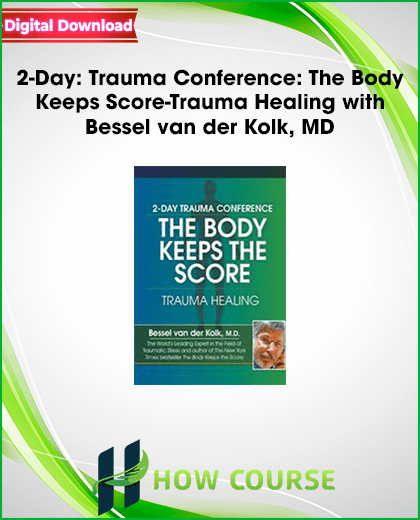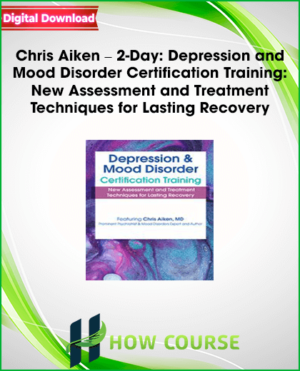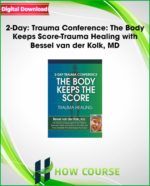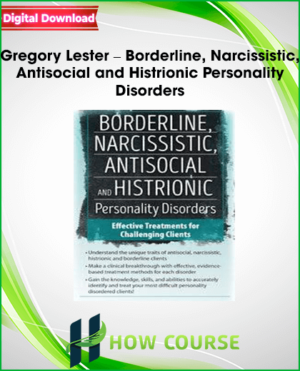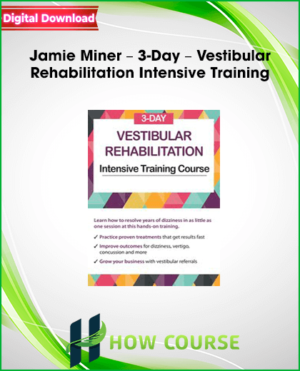Bessel Van der Kolk – 2-Day: Trauma Conference: The Body Keeps Score-Trauma Healing with Bessel van der Kolk, MD
Watch renowned trauma expert and NY Times bestselling author, Bessel van der Kolk, MD, for this transformational intensive recording on the latest research and drug-free treatment techniques for your trauma clients.
Dr. van der Kolk will give you a new understanding of the neuroscience of traumatic stress and the research demonstrating the efficacy and possible limitations of mind-body treatment approaches. He will detail the benefits of neurofeedback, EMDR, meditation, yoga, mindfulness, and sensory integration methods such as dance and movement.
Through intriguing videos, case studies, and masterful explanation, you will learn how to give your clients:
A way to find words that describe what is going on
Ways to regulate their emotions
The ability to trust other human beings after the shameful and horrific details of their lives
The research on the latest tools to process traumatic memories
Transformation! – to be fully alive in the present, not stuck in the past
This is a “don’t miss” recording that is based on Dr. van der Kolk’s own research but also that of other leading specialists.
Analyze & communicate how traumatized people process information.
Determine how sensorimotor processing can alleviate traumatic re-experiencing.
Articulate the range of adaptations to trauma early in the life cycle.
Substantiate how trauma affects the developing mind and brain.
Communicate the recent advances in neurobiology of trauma.
Differentiate between disrupted attachment and traumatic stress.
Break down how adverse childhood experiences affect brain development, emotion regulation & cognition.
Choose techniques of physical mastery, affect regulation and memory processing.
Explore the development of Developmental Trauma Disorder.
Critique the current DSM-5® position on DTD.
Model how to integrate various treatment approaches in your practice.
Through an understanding of the research, explore treatment strategy alternatives to drugs and talk therapy.
Neuroscience & Brain Development
Neuroscience and brain development
How children learn to regulate their arousal systems
How the brain regulates itself
Developmental psychopathology: The derailment of developmental processes & brain development due to trauma, abuse and neglect
How the brain responds to treatment
Early Life Trauma
Interpersonal neurobiology
Adaptations to trauma early in the life cycle
Loss of affect regulation
Chronic destructive relationships towards self and others
Dissociation and amnesia
Somatization
Self-blame, guilt and shame
Chronic distrust and identification with the aggressor
Attachment, Trauma, and Psychopathology
The breakdown of information processing in trauma
Mirror neuron systems and brain development
How to overcome the destabilization and disintegration
The compulsion to repeat – origins and solutions
Difference between disorganized attachment and traumatic stress
Neuroscience, Trauma, Memory and the Body
The neurobiology of traumatic stress
Learned helplessness and learned agency
Restoring active mastery and the ability to attend to current experiences
Somatic re-experiencing of trauma-related sensations and affects that serve as engines for continuing maladaptive behaviors
How mind and brain mature in the context of caregiving systems
The Diagnosis of Treatment of Trauma-Related Disorders
Developmental Trauma Disorder (DTD)
Affect and impulse dysregulation
Disturbances of attention, cognition and consciousness
Distortions in self-perception and systems of meaning
Interpersonal difficulties
Somatization and biological dysregulation
The development of DTD in the DSM-5® as a diagnosis and its implications for assessment, diagnosis and treatment
The Latest Research on Trauma-specific Treatment Interventions
The role of body-oriented and neurologically-based therapies to resolve the traumatic past
Alternatives to drugs and talk therapy
EMDR
Self-regulation, including yoga
Mindfulness
Play and theatre
Dance, movement and sensory integration
Neurofeedback

